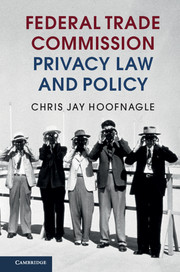Book contents
- Frontmatter
- Dedication
- Epigraph
- Contents
- List of figures
- List of text boxes
- Introduction
- Acknowledgments
- PART I THE HISTORY, POWERS, AND PROCEDURE OF THE FEDERAL TRADE COMMISSION
- 1 History of the Federal Trade Commission
- 2 The FTC and the rise of consumerism
- 3 The modern FTC
- 4 Organizational and procedural basics
- 5 Unfair and deceptive practices
- PART II THE FTC'S REGULATION OF PRIVACY
- PART III CONCLUSION
- Bibliography
- Index
5 - Unfair and deceptive practices
from PART I - THE HISTORY, POWERS, AND PROCEDURE OF THE FEDERAL TRADE COMMISSION
Published online by Cambridge University Press: 05 February 2016
- Frontmatter
- Dedication
- Epigraph
- Contents
- List of figures
- List of text boxes
- Introduction
- Acknowledgments
- PART I THE HISTORY, POWERS, AND PROCEDURE OF THE FEDERAL TRADE COMMISSION
- 1 History of the Federal Trade Commission
- 2 The FTC and the rise of consumerism
- 3 The modern FTC
- 4 Organizational and procedural basics
- 5 Unfair and deceptive practices
- PART II THE FTC'S REGULATION OF PRIVACY
- PART III CONCLUSION
- Bibliography
- Index
Summary
In enacting the Wheeler–Lea Amendments to the Federal Trade Commission Act in 1938, Congress dramatically expanded the power of the Federal Trade Commission. Congress broadened the FTC's organic power from the prevention of “unfair methods of competition in commerce” to include prevention of “unfair or deceptive acts or practices in commerce.” Theories of unfairness and deception now form the basis of FTC privacy law.
This chapter traces the contours of this broad prohibition, focusing on the case-by-case development of the doctrine and policy statements. It is analyzed separately here from the subject-matter chapters in Part II because the FTC's authorities to police unfair and deceptive trade practices are broader than many realize in privacy cases. This chapter makes clear that the FTC could go further in policing privacy practices based on precedent in advertising and other cases. Furthermore, the development of the substantiation doctrine (discussed below) could have profound effects on the market for privacy-protective services when competition on privacy begins in earnest.
Cynics say that the commission does not use an objective or standardized definition of unfairness and deception. There is some truth to that, in part because, by statute and by custom, courts defer to the Commission's judgment concerning what is deceptive and unfair. As we saw in Chapter 1, Congress affirmatively made a policy decision to choose vague language in 1914 and again in 1938 because business practices and technology were constantly evolving, causing new problems that Congress could not quickly act to remedy. Section 5 does not have a static meaning, and lawyers will always have to grapple with its application in new business contexts. As two FTC attorneys put it in 1962, “[Section 5] cannot be defined in terms of constants. More broadly, it is a recognition of an ever-evolving commercial dexterity and the personal impact of economic power as important dimensions of trade. Its underlying proposition is that a free competitive society must have some means of preventing that very freedom to compete from destroying our economic system.”
It is also clear that Congress chose to free the FTC from the restraints imposed by the common law in fraud matters. Yet, imposing common law requirements tends to be the first kind of reform proposed by critics of the FTC.
- Type
- Chapter
- Information
- Federal Trade Commission Privacy Law and Policy , pp. 119 - 142Publisher: Cambridge University PressPrint publication year: 2016
- 1
- Cited by



